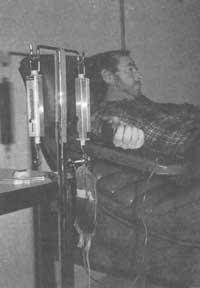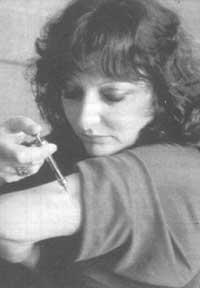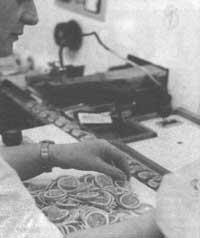How to avoid AIDS contamination?
The virus that produces Acquired Immunodeficiency Syndrome, unlike other infections, is not transmitted in social relations.
- Neither when giving the quintet nor with a hug.
- Giving a kiss, or sharing the glass or cigarette with another person does not transmit AIDS, although the latter are totally contrary to hygiene.
- Public pools, toilets or public telephones are also not vulnerable to pollution.
- The virus is destroyed at temperatures above 56ºC and with bleach.


Human Immunodeficiency Virus (known as HIV) is transmitted by the following pathways:
- By blood: through transfusions, syringes or other sharp instruments, always with a small cutaneous or injection wound.
- Through body fluids or fluids: mainly through semen, although it is not yet very clear, even through tears and saliva.
High-risk groups
The National AIDS Commission has identified and diagnosed about 350 people as affected by the disease, of which 210 have already died (more than 60%).
- Among us, the main risk group is that of drug-dependent people, since they exchange syringes and their promiscuity (this being another risk factor).
- Among the affected people, 11% are women and most of them are addicted. In case of pregnancy, a therapeutic abortion can be requested by law, since the possibilities of fetal contagion are very high (approximately 50%).
- Homosexuals, as well as bisexuals, are in danger according to their promiscuity.
- The plasma analyses performed in recent times allow us, fortunately, to extract hemophiliacs between risk groups. These tests are also mandatory in blood banks to avoid the risk of contamination during transfusions.
However, not all people who have discovered that in an analysis they have antibodies against the HIV virus develop the disease. Currently it is considered that between 20% and 25% of these people will suffer a disease within 5 years: But most of the risk of contagion is also among them, if they do not take preventive measures without knowing they have no symptoms and carry the disease with them.
In our country, more than 100,000 people have contacted the AIDS virus, although most of them will never suffer from the disease. Once in contact, the first symptoms of the syndrome (when they “do” the disease, 2nd phase) are general discomfort, fever, weight loss, muscle aches, joints and increase the size of the lymph nodes. As the virus attacks and destroys the body's defenses in the third phase, the patient is very sensitive to diseases that are easily overcome by a healthy person. Appearance of one or more infections that will kill due to complications.
Minimum measures for all
- Condom (or condom) is the most effective prevention method to avoid the risk of semen contamination.
- Sexual relationships through the buttocks are more dangerous if the condom is not used, since in the anus and back there are always small wounds that can cause the virus that can cause the child.
- Note that this barrier system (the condom) does not offer any kind of protection in non-coital sexual relationships.

Putting aside sexual relations, here are some points that are fully effective as a preventive measure that we should all take into account:
- When you have to give yourself an injection, ask that the syringe seal be broken in front of you.
- Share the toothbrush (brush) and shaving knife with other people.
- Always use the condom in home sexual relationships.
- If you need help for yourself or for a family member or friend, you have the AIDS phone at your disposal: In Donostia-San Sebastián (943) 282666, inaugurated on December 15, 1987, completely confidential and with the information you want.
You can live with anyone who has antibodies against the virus without any risk if you take the simple measures we have mentioned.





